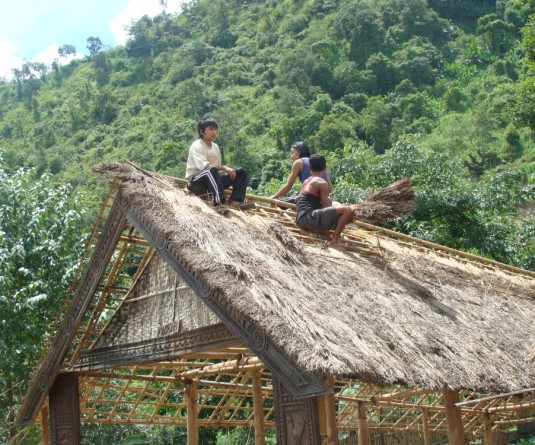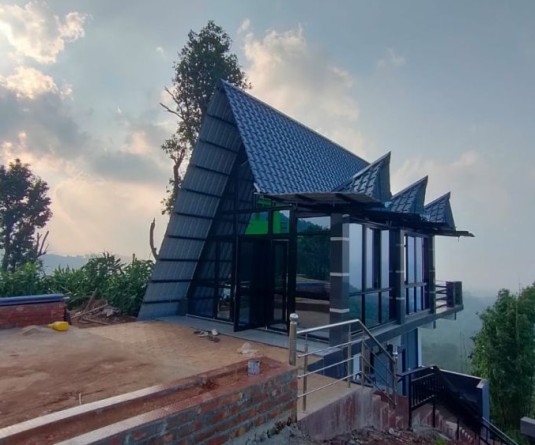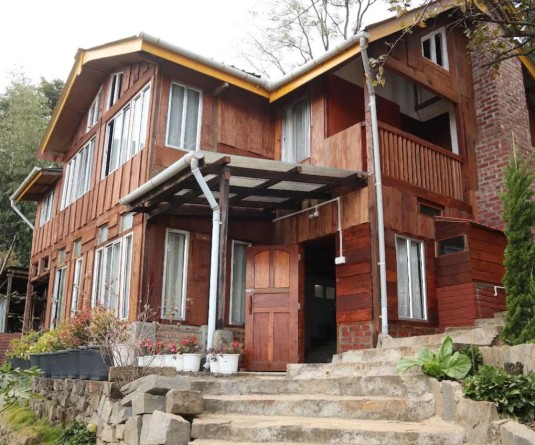Fishermen returning home with their catch after a day’s work at River Doyang.
Zanbeni Humtsoe
Wokha | April 21
Wokha | April 21
Located about 70 km from Wokha Town, the village of Old Aree finds itself nestled in the pristine blues and greens of River Doyang. Over the years, this river has become a boon for the young and able members of the village, enabling many to overcome poverty by relying on it for survival. This has helped bring up a considerable number of young professional fishermen who owe their survival to this giant beauty.
Nzanbemo (33), for instance, has been fishing for more than 10 years now. An energetic, young father of six, Nzanbemo, along with more than a dozen fishing-mates, spends weekdays on the river, fishing for survival. Every Monday morning, they trek down the steep slopes, laden with weekly ration and other essentials. They return on Saturdays to spend weekends with their friends and family waiting back home.
For a fisherman navigating the serpentine river, the best season is between May and January, informs Nzanbemo. These are the peak months when an average catch per day ranges from 20-30 kg, fetching fishermen a profit of Rs.7000-8000 (approximately) per month. February and March are off season for fishing in this river due to considerable decline in water level.
Nzanbemo and his village folk observe that besides the betterment of economic conditions of the village, fishing has manifested a visible social change. Statistics reveal considerable decline in incidents of petty crimes as well as substantial decrease in the number of victims of substance abuse among the younger generation in Old Aree. Proud and confident, Nzanbemo claims, “The young folk of my generation are willing to work hard to provide for our family without depending on our parents, no matter the amount of struggle we face every day.”
But despite the financial security, Nzanbemo wants to ensure that his children do not follow in his footsteps, for being a first-generation fisherman in his village is a daily struggle. There is no road connectivity from his village to the river. It takes more than two hours to reach the base where the hills are beckoned by the wide expanse of the river. His load is heavier on the return trip since he has to carry the week’s catch on his back and climb up the hills. This creates a marketing limbo as well since willing buyers cannot readily access the produce. The fishermen have to mostly rely on their wives to sell the goods in the nearest market, which is in Mokokchung. Fetching fishing equipment is another hassle. Nzanbemo rows his self-made canoe down the river towards Doyang Town for around three hours just to procure fishing equipment. This trip costs him six hours of rowing time, to and fro.
Above all these hardships, Nzanbemo and his mates are ignorant of any government funded assistance available to the fishing community in Nagaland. In his decade-old career, the only thing he remembers getting is a life-jacket; it came from an acquaintance. He has never heard of the Centrally Sponsored National Scheme for Welfare of Fishermen or many other such schemes available for the fishing community to provide them with financial assistance, essential equipment, as well as measures to improve their livelihood.
For now, Nzanbemo’s wish list consists of fishing nets, canoes, and, of course, road connectivity and motor boats which could facilitate accessibility to buyers and sellers alike. On being asked if it is worth being a fisherman in Nagaland, Nzanbemo responds in the affirmative, “it is the only profitable means available to people like me.”






